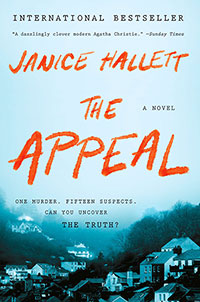
By Dennis Fischman
The epistolary novel is a story that’s told mostly or entirely in correspondence between two people or more. It’s a classic genre, with examples as old as Pamela (1740) and Frankenstein (1818) and much more recently, The Color Purple (1982) and The White Tiger (2008). There have even been murder mysteries in this format: think The Documents in the Case by the classic mystery writer Dorothy Sayers (better known for her series starring Lord Peter Wimsey).
In this book, Janice Hallett uses some of the conventions of the genre. For instance:
- A frame story involving a law firm whose Senior Partner is not sure his client – who has confessed to murder – is really guilty. (He assigns two younger lawyers to go through all the documents in the case to find out if they see a different murderer with a different motive.)
- A literal “cast” of characters: the members of the Fairway Players amateur theater company and their families.
- People who are not who they say they are.
- People with mysterious pasts in other countries.
- Secrets and lies.

“The Appeal” by Janice Hallett. Atria Books, 2021, 419 pages
What makes The Appeal a 21st century bestseller is that instead of letters and paper documents, nearly all the files we are reading over the shoulders of the young lawyers are electronic: emails and text messages. Their conversations with each other and with their boss are also electronic, so at crucial points in the story, we get to listen to them spin out their theories, make their discoveries, and finally, solve the mystery.
It’s also contemporary because our sleuths are young women lawyers, and many characters in the book are African or Asian, and none of them are simple stereotypes. Compared to classic mysteries, that’s a breath of fresh air.
Yet my feelings about The Appeal are mixed. On the one hand, I zipped right through this book, even though we won’t be discussing it at the Somerville Public Library Murder Mystery Book Club until August 28. I liked the young lawyers who were reading all the documents, and I appreciated having their lists of characters and relationships, their discussions, and eventually, their theories. It helped me keep track of who was who and what was what.
On the other hand, there were too many characters, and I didn’t like a single one of them! Some of them seemed like high school gossips and attention-seekers; others had such strange motives and such illogical behaviors as a result of those motives that I couldn’t sympathize with any of them, victims, suspects, what have you.
Over all, the main thing that was intriguing about this book – the setup for the epistolary novel in 21st century form – was also what spoiled it for me. We are supposed to believe that the head of the law firm is having second thoughts and feeling guilty about pleading his client guilty when he is now doubting her confession, and that he employs two of his younger associates to read through everything and see if they see what he does … and then he cheats by pointing them in the direction his own theories are taking him? What good would that do? It’s artificial without any real artifice.
I had to feel bad for the child whose illness was exploited to raise money. I think that twenty years from now, little Poppy will find a way to go back and kill her family. There’s a book I would read!
Dennis Fischman is a member of the Somerville Public Library’s Mystery Book Club and an inveterate reader.















Reader Comments